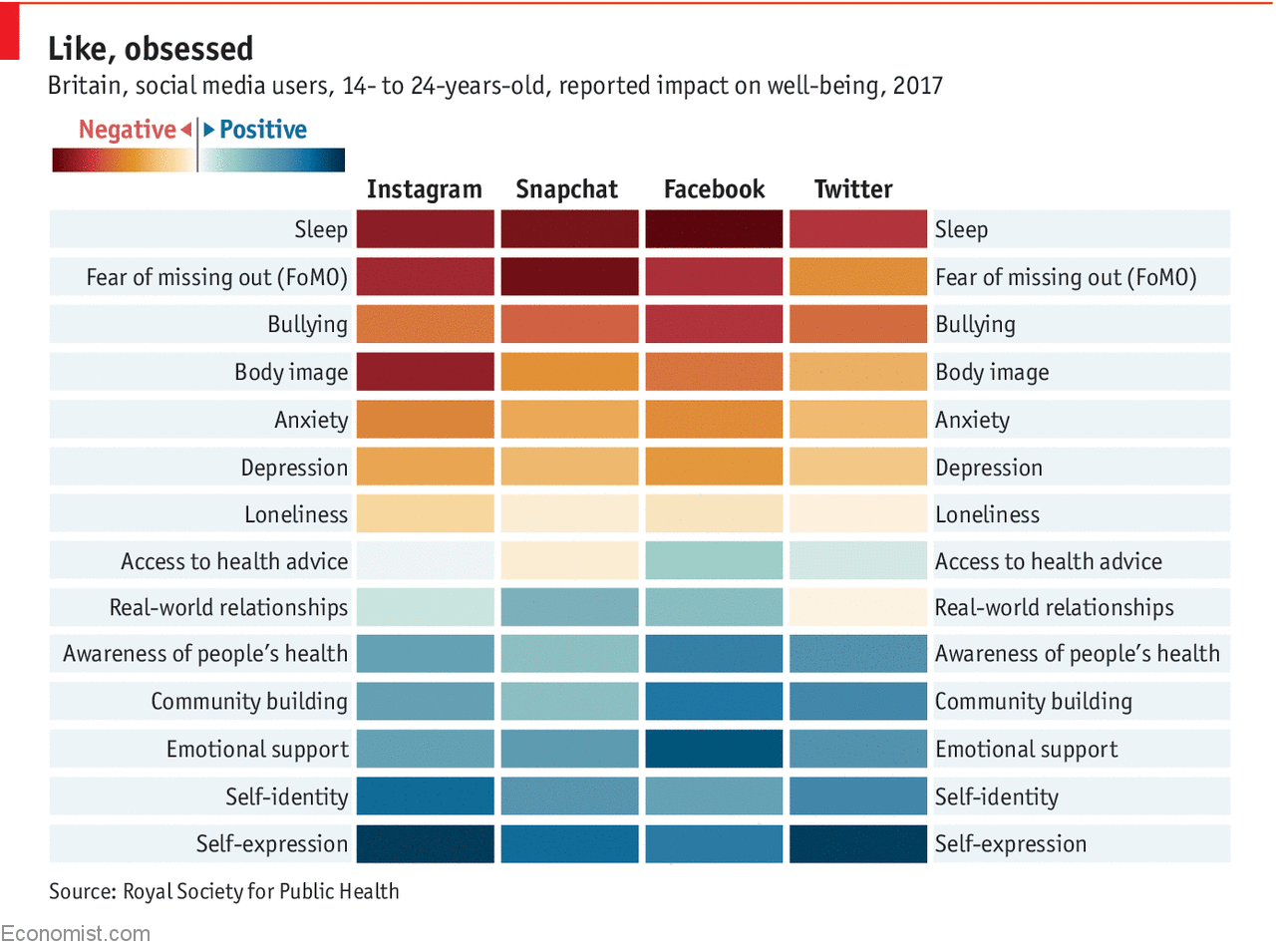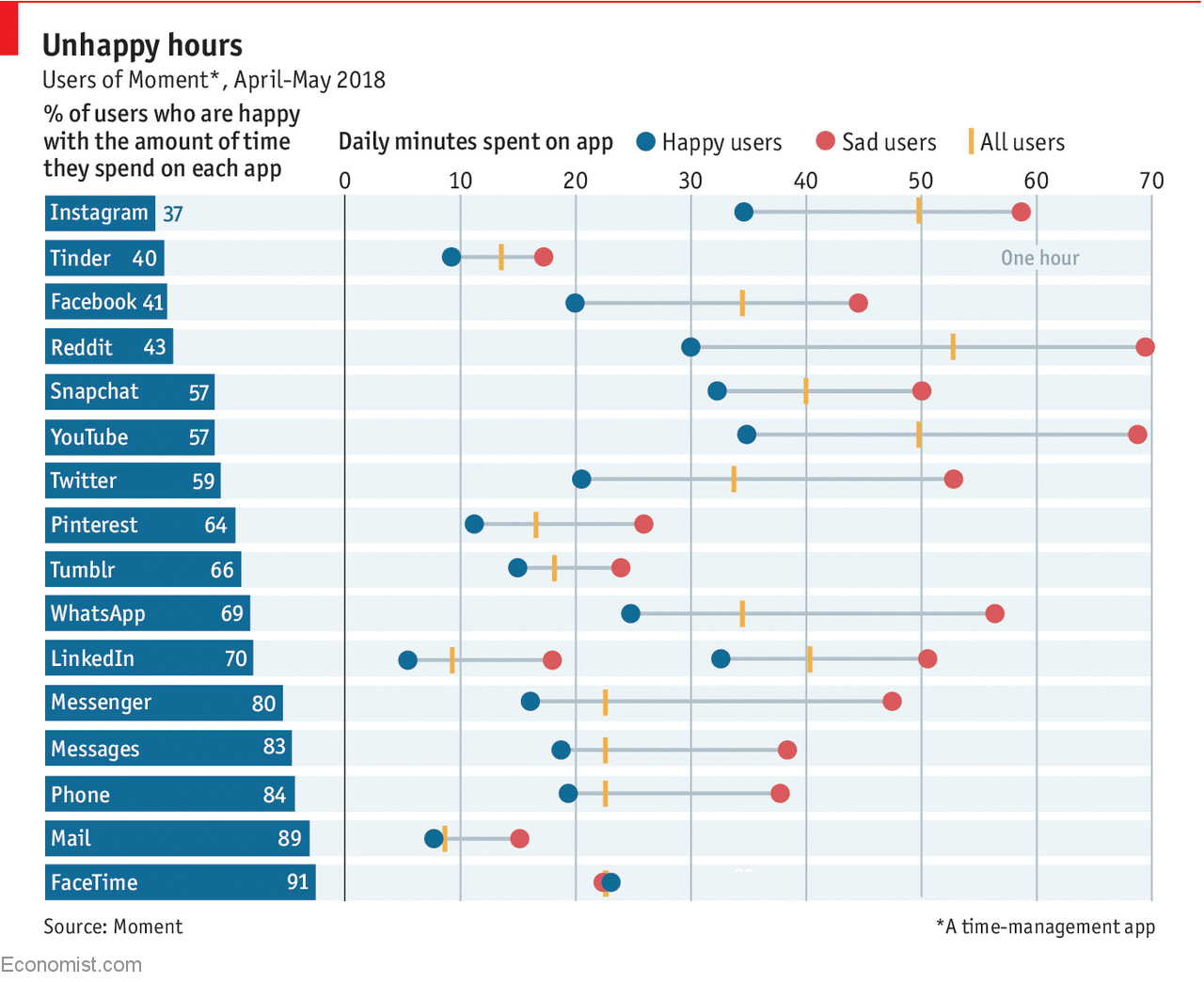Youngsters report problems with anxiety, depression, sleep and “FoMO”

MAY 20th will mark the end of “mental-health awareness week”, a campaign run by the Mental Health Foundation, a British charity. Roughly a quarter of British adults have been diagnosed at some point with a psychiatric disorder, costing the economy an estimated 4.5% of GDP per year. Such illnesses have many causes, but a growing body of research demonstrates that in young people they are linked with heavy consumption of social media.
It is my sincere desire to provide readers of this site with the best unbiased information available, and a forum where it can be discussed openly, as our Founders intended. But it is not easy nor inexpensive to do so, especially when those who wish to prevent us from making the truth known, attack us without mercy on all fronts on a daily basis. So each time you visit the site, I would ask that you consider the value that you receive and have received from The Burning Platform and the community of which you are a vital part. I can't do it all alone, and I need your help and support to keep it alive. Please consider contributing an amount commensurate to the value that you receive from this site and community, or even by becoming a sustaining supporter through periodic contributions. [Burning Platform LLC - PO Box 1520 Kulpsville, PA 19443] or Paypal
-----------------------------------------------------
To donate via Stripe, click here.
-----------------------------------------------------
Use promo code ILMF2, and save up to 66% on all MyPillow purchases. (The Burning Platform benefits when you use this promo code.)
According to a survey in 2017 by the Royal Society for Public Health, Britons aged 14-24 believe that Facebook, Instagram, Snapchat and Twitter have detrimental effects on their wellbeing. On average, they reported that these social networks gave them extra scope for self-expression and community-building. But they also said that the platforms exacerbated anxiety and depression, deprived them of sleep, exposed them to bullying and created worries about their body image and “FOMO” (“fear of missing out”). Academic studies have found that these problems tend to be particularly severe among frequent users.
Sean Parker, Facebook’s founding president, has admitted that the product works by “exploiting a vulnerability in human psychology”. Indeed, an experiment by five neuroscientists in 2014 concluded that Facebook triggers the same impulsive part of the brain as gambling and substance abuse. Yet it is difficult to prove that obsessing over likes and comments causes mental illness, rather than the other way around. The most convincing effort was a survey that tracked a group of 5,208 Americans between 2013 and 2015. It found that an increase in Facebook activity was associated with a future decrease in reported mental health.

An obvious solution to the problem is to cut down on screen time. Even the most obsessive users should be able to do so. The neuroscientific study on Facebook found that the subjects’ cognitive ability to inhibit their impulsive behaviour was less impaired than for drug or gambling addicts. And data from Moment, an activity-tracking app, show that it is possible for light social-media consumers to be content. Each week it asks its 1m users whether they are happy or sad with the amount of time they have spent on various platforms. Nearly 63% of Instagram users report being miserable, a higher share than for any other social network. They spend an average of nearly an hour per day on the app. The 37% who are happy spend on average just over half as long.
The happiness rate is much higher for FaceTime (91%), a video-calling app, and phone calls (84%). When it comes to social networking, actual conversations are hard to beat.





Is that chart supposed to relate information or just random words and colors?
Doesn’t matter if your a kid or an adult. If your self worth is tied up in what others think of you, you’re going to be fucked up.
That pretty much sums it up WTF.
I’ll admit I went temporarily insane right after I signed up for facecrap. It extended to all online forums. My first nickname I used on TBP was KingShat even. I think it’s more than just social media. For me it was 1) being able to say what I wanted to say 2) not being interrupted and 3) thinking everyone gave a crap about what I thought.
The good thing from all of it was that I realized its a big world where everyone seems to have a different reality than I. I believe I act much more in accordance to that new-found understanding.
The instant I signed up to a focused FB group I was besieged and overwhelmed with all sorts of messages having to do with who happened to have viewed an image posted by someone else in the group, who happened to have responded with a comment to someone else’s comment, and about ten levels of shit that I could not care less about but that FB insisted I be made aware of continuously and In Real Time Front and Center.
I can’t recall if it took 48 or only 24 hours, but I withdrew from the group (with which I was actually really interested in interacting if it weren’t for FB fuckery) and I thereafter “deleted” my FB profile altogether to the extent allowed. Diminishing Returns on Technology / Ain’t Nobody got Time for That Shit.
What continues to interest me is what the remaining value might be in FB as people come to abandon it as was done with MySpace. Abandonment of the platform, to me, seems inevitable, but I don’t foresee people pulling the plug as I did so much as migrating to some Next New Thing. Not because online interaction is necessarily so great, but that their Real Life alternatives are so sucky. Viz. cosplay: “After a long, slow process, Mr. CafPow is finally willing to cosplay from an anime at a convention. I have chosen Kiki and Tombo from Kiki’s Delivery Service for a few reasons.” (taken from a post today from a middle-class adult on a popular forum about knitting and weaving). If any partner of mine, sexual or not, were ever impelled to “cosplay from an anime” our relationship would be in question. YMMV.
Scary percentages of people looking into screens while walking/driving in my rural town of just a few thousand.
I once read an essay by a MD talking about how as youngster in high school , his father made up time consuming manual work -moving bricks from one pile to another – just to keep him occupied in his spare time and how he hated him for it. He went on to explain how later on in life he came to understand that his father was merely creating work to burn off the flood of testosterone laden hormones that otherwise if not provided a vehicle for release would drive a young man insane. Point of this comment is to say that parents who do not supervise the spiritual and physical development of their sons and daughters are not good parents, but something else. Crap in. Crap out is an absolute truth.